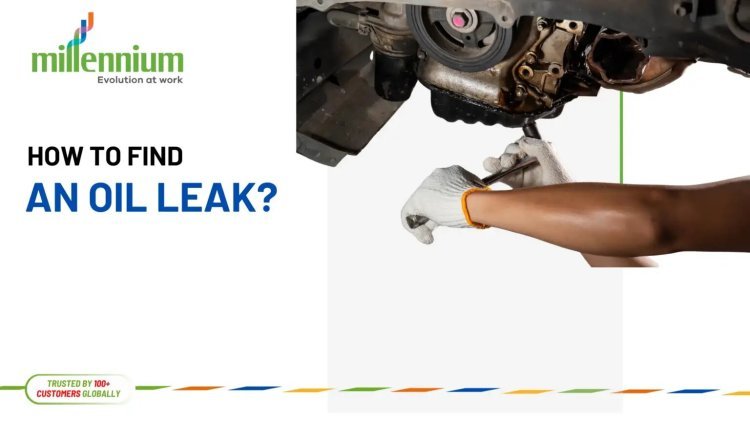How To Find An Oil Leak
Oil leaks in your vehicle's engine can be a frustrating and potentially costly issue. If left unchecked, an oil leak can lead to severe engine damage, reduced performance, and even safety hazards

Introduction
Oil leaks in your vehicle's engine can be a frustrating and potentially costly issue. If left unchecked, an oil leak can lead to severe engine damage, reduced performance, and even safety hazards. Identifying and fixing an oil leak early can help maintain your vehicle’s efficiency and prevent further complications. This guide will walk you through the signs of an oil leak, methods to detect it, and ways to fix and prevent future leaks.
Signs of an Oil Leak in Your Engine
Recognizing the early signs of oil leak in engine can save you from major repair costs. Here are some common indicators:
-
Oil Spots Under the Car: If you notice dark, greasy spots or puddles on the ground where your car is parked, it’s a clear sign of an oil leak.
-
Burning Oil Smell: A strong, burnt oil odor inside or outside your vehicle suggests that oil is leaking onto hot engine parts.
-
Smoke from the Engine: Blue or gray smoke coming from the engine bay or exhaust system may indicate an oil leak.
-
Low Oil Levels: If you frequently need to top off your engine oil despite regular maintenance, a leak might be the culprit.
-
Illuminated Oil Warning Light: Many modern vehicles have an oil pressure warning light that alerts you to potential issues, including leaks.
-
Unusual Engine Performance: Oil leaks can cause the engine to overheat, resulting in sluggish performance or knocking noises.
How to Detect an Oil Leak
Once you suspect an oil leak, follow these steps to confirm and locate the source:
-
Check the Oil Level: Use the dipstick to see if your engine oil level is lower than normal. If it drops quickly, you likely have a leak.
-
Inspect Under the Vehicle: Look for oil stains or wet spots underneath the engine and along the frame.
-
Examine Engine Components: Common leak sources include the oil pan, valve cover gasket, oil filter, drain plug, and oil seals.
-
Use a UV Dye Test: Adding UV dye to the engine oil and using a UV flashlight can help pinpoint the exact location of a leak.
-
Monitor for Drips: Place a clean cardboard or paper under the car overnight to track where the oil is leaking.
-
Check the Oil Cap and Filter: A loose or damaged oil cap or filter can cause oil leaks and should be securely tightened or replaced.
How to Fix an Oil Leak
Fixing an oil leak depends on the severity and location of the leak. Here are some common solutions:
-
Tighten Loose Components: Ensure the oil drain plug, filter, and cap are properly secured.
-
Replace Worn-Out Gaskets and Seals: The valve cover gasket, oil pan gasket, and crankshaft seals can wear out over time and may need replacement.
-
Use an Oil Leak Stopper Additive: Some products can temporarily seal small leaks and prevent further leakage.
-
Repair or Replace the Oil Pan: If the oil pan is cracked or damaged, it may need to be replaced or repaired.
-
Inspect and Replace the PCV Valve: A faulty Positive Crankcase Ventilation (PCV) valve can cause excess pressure, leading to leaks.
-
Seek Professional Help: If you’re unable to locate or fix the leak, consulting a mechanic is advisable.
Preventing Future Oil Leaks
Taking preventive measures can help you avoid future oil leaks and prolong your engine’s lifespan. Here’s what you can do:
-
Regular Maintenance: Schedule routine oil changes and inspections to catch potential leaks early.
-
Use High-Quality Oil and Filters: Cheap or low-quality products can contribute to leaks and engine damage.
-
Check Gaskets and Seals Periodically: Look for signs of wear and replace them before they fail.
-
Avoid Overfilling the Oil: Excess oil can increase pressure, causing seals and gaskets to leak.
-
Monitor Engine Temperature: Overheating can deteriorate engine components and lead to leaks.
Conclusion
Finding and fixing an oil leak is essential for maintaining your vehicle’s health and avoiding costly repairs. By recognizing the signs, detecting the source, and taking preventive measures, you can ensure your engine runs smoothly and efficiently. Regular maintenance and prompt attention to leaks will help keep your vehicle in top condition for years to come.
What's Your Reaction?











